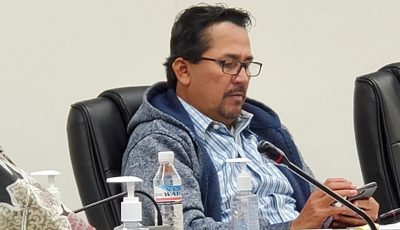Justices hear issue whether nothing bars Tinian delegation from amending casino law
The CNMI Supreme Court heard yesterday the appeal from the Superior Court’s ruling that Article 21 of the NMI Constitution does not bar the Tinian and Aguiguan Delegation from amending the revised Tinian Casino Gaming Control Act.
The high court justices also heard the issue whether the term of each member of the Tinian Casino Gaming Control Commission is calculated on a fixed calendar basis or begins when each member assumes office.
After hearing the arguments, Associate Justice John A. Manglona and Justices Pro Tem Robert J. Torres Jr. and Katherine A. Maraman placed the matter under advisement.
Attorney Joseph E. Horey argued for plaintiffs-appellants former TCGCC executive director Lucia L. Blanco-Maratita and former TCGCC inspector Lisa-Marie B. Aguon.
Attorney Matthew T. Gregory argued for defendants-appellees Tinian Mayor Joey P. San Nicolas, Tinian municipal treasurer Maria Barbara Borja, and the Municipality of Tinian and Aguiguan.
TCGCC, Blanco-Maratita, and Aguon sued San Nicolas and then Tinian municipal treasurer Charlene M. Lizama over the mayor’s refusal to pay them the salaries that TCGCC had increased in December 2014.
San Nicolas paid only the salary amount as allocated in the Budget Act.
Then-TCGCC chair Mathew Masga, vice chair Bernadita Palacios, and commissioner Lydia Barcinas intervened in the lawsuit after the mayor asserted that their terms had already expired and that he would appoint three new commissioners.
In November 2015, then-Superior Court Associate Judge David A. Wiseman ruled that Article 21 of the CNMI Constitution does not bar the Tinian Delegation from amending the revised Tinian Casino Gaming Control Act.
Wiseman cited Article 21 that states, “Gambling is prohibited in the Northern Marianas Islands except as provided by Commonwealth law or established through initiative in the Commonwealth or in any senatorial district.”
Wiseman denied TCGCC’s motion that requested the court to declare invalid three local laws: Tinian Local Law 14-1, Tinian Local Law 18-5, and sections of the Tinian Local Ordinance 18-3.
Local Law 14-1 amended the revised Tinian Casino Gaming Control Act by enacting provisions, “to regulate the building and licensing of a hotel-casino in phases, to authorize and regulate the employment in the casino of persons over the age of 18 years; to reduce the casino license application fee, to reduce the penalties for fees and taxes, to authorize the TCGCS to waive or defer payment of such penalties, to permit and regulate credit wages; and for other purposes.”
Tinian Local Law 18-5 amended the revised Tinian Casino Gaming Contract Act by enacting provisions, “for the purpose of updating the casino gambling tax to adapt to Asian-style gaming and to boost the Asian ‘high roller’ gaming market.”
A section of Tinian Local Ordinance 18-3, the Tinian Municipal Appropriations Act of Fiscal Year 2015, states that “no funds shall be programmed from personnel and non-personnel accounts to other personnel accounts to increase any salary from its current level…”
Another section of Tinian Local Ordinance 18-3 states that “no position or FTE pay level approved by this Act shall be increased and the funds appropriated shall not be reprogrammed to increase any pay level…”
The other section of Tinian Local Ordinance 18-3 states that “notwithstanding any law to the contrary and except as provided for in section (b) of this section, the funds appropriated pursuant to this Act shall not be used to increase the salary of any employee or any position from its current level or new level as set forth and appropriated by this Act.”
In December 2015, Wiseman issued an order that disagrees with TCGCC’s position that under the plain language of a section of the Casino Act, where a commissioner is confirmed, his or her term runs from the date of confirmation, as opposed to staggered fix-date terms.
Wiseman ruled that Section 5 of the Casino Act provides for a formal staggering system or that each of the commissioner’s term should run from the date of appointment for the first set of commissioners.
In opposing TCGCC’s argument, the Tinian government’s position is that each of the commissioner’s term should run from March 30, 1990, the date of appointment for the first set of commissioners, under a formal staggering scheme.
Blanco-Maratita and Aguon then appealed to the CNMI Supreme Court from Wiseman’s ruling. They asked the high court to reverse Wiseman’s decisions.
In Blanco-Maratita’s and Aguon’s brief, Horey said this is an action seeking to uphold the integrity of the popularly-enacted Revised Tinian Casino Gaming Control Act, and the independence of TCGCC.
Horey said in recent years, the Tinian Legislative Delegation has become increasingly assertive in acting on its own perceived right to amend the Casino Act.
Horey said at the same time, the Tinian mayor has adopted and acted upon a new interpretation of the terms of commissioners, which would allow him to more rapidly replace incumbent commissioners with his own appointees.
Horey asked the high court to review and invalidate the encroachments by the mayor and the delegation.
Horey said all three local laws at issue on this appeal are unconstitutional and invalid.
He asserted that under Article 21 of the CNMI Constitution, local laws are constitutionally incapable of amending a gambling law.
Horey said the challenged provisions of Tinian Local Ordinance 18-3 are unconstitutional for the further reason that they violate the principle of separation of powers.
In San Nicolas, Borja, and the Municipality of Tinian and Aguiguan’s opposition, Gregory asked the high court to uphold Wiseman’s decision.
Gregory said Blanco-Maratita and Aguon lack standing to raise issues relating to the terms of commissioners. He said only the commissioners have standing to raise this issue or the TCGCC.
Gregory said members of the public have no standing to seek review of statutes or local laws “without injury in fact.”
He said if the high court feels the need to arrive at a decision or the merits, the high court should find that the three local laws at issue be held upheld as valid exercises of appropriation of power of the Tinian Delegation, and the Local Law At, which allows for the amendment of local initiatives.
Gregory said Article 21 of the CNMI Constitution does not prevent the passage of local laws that would amend or modify a local initiative.
“While gaming can only be established by the people via a local initiative, it may be amended by local law,” he said.
Gregory said nothing in the constitution or laws of the CNMI prohibit such an amendment and the high court should not imply such a prohibition; especially when it is directly contradicted by Commonwealth law through Article 2 section 6 of the CNMI Constitution and the Local Law Act of 1983.


























